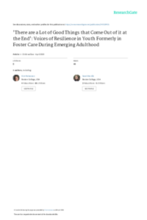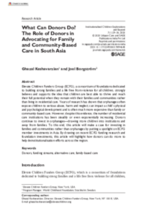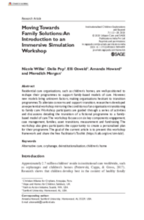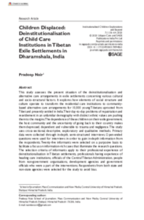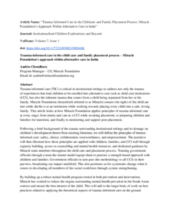Displaying 271 - 280 of 962
This study uses interviews with 20 youth formerly in foster care who exhibit better-than-average outcomes to explore contextual aspects of resilience during emerging adulthood, elucidating how both relational and organizational support contribute to their resiliency.
This paper utilises data generated through an ‘empowerment group’ for care‐experienced young people; it illustrates how an ecological understanding of agency, as a heuristic, might further understanding of the lives of care‐experienced young people.
This article, an auto-ethnographic collaboration between a social work professional and two care leavers, aims to address the problems with records compiled by care workers, social workers and other relevant personnel by constructing a ‘virtual archive’ consisting of several hypothetical records compiled in the style typically employed by caseworkers, which are then critiqued by the care leavers.
In this study, the authors analysed data from 27 interviews with parents whose children were removed by child welfare and four focus groups totalling 18 staff from a parent education service provider.
In this study, the authors analysed data from 27 interviews with parents whose children were removed by child welfare and four focus groups totalling 18 staff from a parent education service provider.
This article will make a case for investing in families and communities rather than orphanages by putting a spotlight on ECFG member investments in Asia.
The goal of the current article is to present this workshop framework and share the free Facilitator’s Toolkit.
This paper reports findings from an innovative arts‐based intervention with Looked After Children and young people and concludes that holding these competing value sets in creative tension is central to the success of the programme in helping young people to cope with and contest social harm.
This study assesses the present situation of the deinstitutionalisation and alternative care arrangements in exile settlements concerning various cultural and socio-structural factors.
This article looks at how Miracle Foundation applies principles of trauma-informed care (TIC) at every stage: from intake and care at a CCI while awaiting placement, to preparing children and families for transition, and finally to supporting post-placement.

